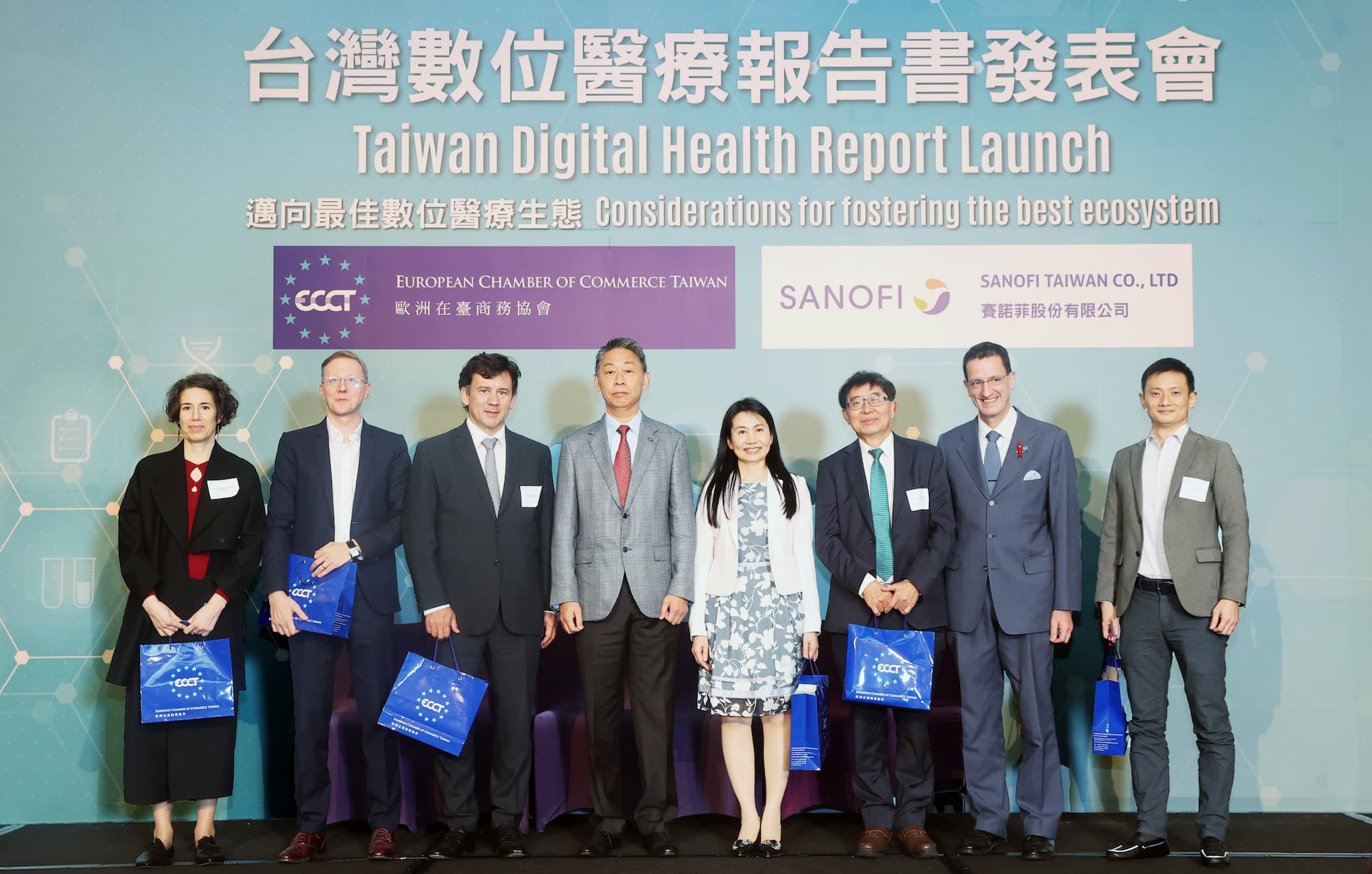Launch of digital health report

The ECCT arranged a Premium Event lunch to launch a report titled "Taiwan Digital Health - Considerations for fostering the best ecosystem", sponsored by Sanofi and presented in association with the ECCT with the support of La French Tech Taiwan. The report examines the missing links in existing structures and the efforts required to propel the digital health industry in Taiwan. It also provides suggestions to support a consolidated, collaborative, and risk-based model to foster digital health innovation, based on experiences from the US, Germany, France, and the UK. Read the digital health report in English or Chinese.
At the launch event, presentations were given by Dr Hasnaa Fatehi, Founder of QARALOGIC Consulting; Anthony Jones, Head of Virtual Healthcare at Sanofi; Dr Wu Shiou-Mei, Director General of the Taiwan Food and Drug Administration (FDA), under the Ministry of Health and Welfare (MOHW) and Dr Lee Po-Chang, Director General of the National Health Insurance Administration (NHIA), MOHW. The event concluded with a panel discussion on the status and prospects for digital health development in Taiwan moderated by Dr Hasnaa Fatehi and featuring all of the speakers as well as panellists Jorge Wagner, General Manager of Novartis (Taiwan) and Ed Deng, CEO of Health2Sync.
In her presentation, Dr Hasnaa Fatehi gave an overview of the report which notes that adopting digital data analysis allows the early detection of disease, which decreases potential future health risks. The report cites the example of Germany, which was the first country in the world to prescribe digital health apps. She added that France looks likely to follow Germany's example given strong support from French President Emmanuel Macron.
The key to its success is the support given by Germany's healthcare authorities to Digital Health Applications (DiGA), which acted as a catalyst for digital transformation. According to Fatehi, during the first year of launch, over 50 medical apps and roughly 73 million individuals benefited from this certification process. The digital solutions have been implemented in disease areas such as obesity, depression, and sleep disorders. The report notes that while Taiwan has the advantage of a sophisticated information and communications technology (ICT) industry and a mature healthcare environment, it still faces many unmet needs in developing digital health. Hurdles include getting funding and reimbursement, regulatory obstacles, interoperability, and cybersecurity.
The report highlights the challenge of real-world data application, regulatory approval, and reimbursement issues, concluding that it is necessary to undertake a digital health transformation after the Covid-19 outbreak.
According to ICLG, a platform for legal reference, there is no clear definition of "digital health" under Taiwan law. So far, only three Software as Medical Device (SaMD)-based digital health solutions have been approved in Taiwan and requirements are getting more stringent. In other words, as a fund-raising strategy, digital health start-ups may have to first secure a US FDA clearance and then use that to obtain Taiwan FDA approval, which makes the entire process more difficult.
Furthermore, the regulatory pathways for digital health device commercialisation in Taiwan remain unclear. For this reason, people are unlikely to get new, non-reimbursable medical devices and technologies under the health insurance system. Digital health solutions which are being actively developed now, are likely to continue to face hurdles if the government fails to improve the reimbursement structure.
Dr Fatehi concluded with four key considerations and suggestions drawn from the report based on the experiences of leading digital health markets: 1) Creation of a cross-agency advocate within the government focused on digital health; 2) Creation of an e-health platform, a one-stop shop for manufacturers, regulators, insurers, and other players to work together to support digital health innovators; 3) Establishment of a road map for development, certification, approval, and reimbursement specific to digital therapeutics (DTx) solutions and 4) Definition of pre- and post-market regulations designed to support the quick launch of digital solutions while ensuring patient-centricity.
In his presentation, Anthony Jones, Head of Virtual Healthcare at Sanofi gave an example of a digital health application for diabetes patients that has been successful in Taiwan. He noted that while medications to treat diabetes had improved, successful treatment has to also consider patient behaviour. The solution he described is not designed to replace the doctor but to give doctors and patients better data to help them improve treatments and patient outcomes. In addition to providing insulin injections, it also uploads and analyses data, monitors blood glucose levels and notifies patients if they forget to take their injections and notifies doctors when the insulin levels of patients show abnormal patterns so that they can take follow-up action.
In her presentation, FDA Director General Dr Wu Shiou-Mei spoke about the management framework of digital health in Taiwan. She acknowledged that digital health was still in its infancy. Taiwan established an AI Medical Device Center on 7 May this year. The platform set up under the centre offers consultation, assistance, and training (including video training courses), guidelines for industry and a matchmaking facility. DG Wu said that although the pandemic may have slowed down implementation, there had already been successful cases making use of the platform. She added that 78 products were approved in 2020 and 47 so far this year.
In his presentation, Dr Lee Po-Chang spoke about how the National Health Insurance system can assist in accelerating digital healthcare.
The event concluded with a panel discussion on the status and prospects for digital health development in Taiwan moderated by Dr Hasnaa Fatehi and featuring all of the speakers as well as panellists Jorge Wagner, General Manager of Novartis (Taiwan) and Ed Deng, CEO of Health2Sync.
